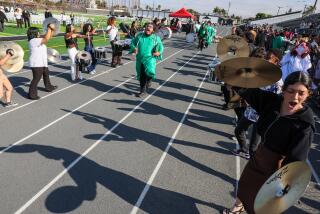This Free Offer Probably Wonât Last Long : Music: Outdoor concerts have provided summers of fun for generations. But many have succumbed to budget cuts.
Stephen Rochford fondly recalls the warm summer evenings of his childhood in Fullerton, picnicking with his family in neighborhood parks while listening to a concert band playing classical and pop tunes.
Today, Rochford directs the Irvine Valley College Summer Band, one of a handful of community-based bands carrying on that tradition for a new generation.
Back in the 1960s, community bands in Orange County drew big crowds--at least 500 people, routinely, Rochford recalled. Now fewer people show up at such events; audiences seldom number more than 350, he said.
âBecause we have de-emphasized music literature in school, teen-agers have not been exposed to classical and jazz music,â Rochford said. âThereâs nothing wrong with rock music, but it needs to be a part of the entire music picture.â
Is the old-fashioned band concert in the park headed for extinction?
In Orange County, as most anywhere in the country, such performances have long been among the rites of summer. They give families a place to spend a few hours together, perhaps relaxing on a quilt spread on a scenic park lawn at dusk, munching sandwiches and sipping wine or lemonade or chatting with neighbors while chasing toddlers.
And, not incidentally, enjoying Sousa marches and Broadway favorites.
âEven children love concerts in the park because they donât have to sit still,â said Pamela Doss, recreation supervisor for the city of Orange.
Outdoor concerts by the traditional concert band--which includes all of the brass, woodwind and percussion instruments of the orchestra, but none of the strings--have been threatened in recent years by budget cuts on a variety of levels.
Some cash-strapped cities have slashed subsidies for summer concerts in the park. This year, Anaheim decided it could no longer afford to put on concerts in Pearson Park--a decades-old tradition.
Two years ago, Orange also abolished its concerts-in-the-park program. The series was revived this summer, thanks to a donation of $2,600 from Target Stores. Community concerts this summer have featured symphonic bands as well as everything from bluegrass to classical music on Wednesday nights in Hart Park. (The series concludes this week with a country band, Richard Rausch & Ricochet.)
When concerts in the park disappear, nearby residents often mourn their loss, as Orange recreation supervisor Doss can testify.
âPeople are very, very appreciative to have the concerts back,â Doss said. âThey call to tell us how much they missed them.â
*
While city funding may go and come, as it did in Orange, a bigger problem is the long-term damage done by dwindling state and federal funding for public-school music instruction.
Randall Coleman, director of the Orange Symphonic Band and music coordinator for Santa Ana Unified School District, said he has watched participation in high-school bands drop by 50% since the early 1980s.
âMost of our students donât have an opportunity to take private lessons,â said Coleman. Consequently, âweâre still drawing band members who learned to play instruments in elementary school. Iâm concerned that in the future we will suffer not only from a decrease in band participation, but also in audience participation.â
With the declining number of community-based bands, some cities turn to military bands when they do hold such concerts: performing recently in Breaâs City Hall Park was the 3rd Marine Aircraft Wing Band from the El Toro Marine Corps Air Station.
In general, concerts in the park attract children under 12--still young enough to be dragged along by parents--and adults over 30.
âCutbacks have had an impact on audiences,â Saddleback director Rochford said. âIâd like to see larger audiences and more age diversity.â
*
Likewise, most of the musicians who play in these groups are over 30.
âIf we relied on 18- to 25-year-old (musicians), we wouldnât have community bands around,â Coleman said.
The shrinking number of children exposed to music in grade school and then high school eventually takes a toll on college music departments--and down the line, of course, on community bands.
âIn 1980, we had 500 music majors,â said Benton Minor, who recently retired after teaching music at Cal State Fullerton for 26 years. âIf there were 260 now, Iâd be surprised.â
Minor attributed some of the decline to a new emphasis on subjects deemed more critical.
âProfessors were getting so many students who could not express themselves in writing that colleges began requiring more English classes to graduate,â Minor said. âIt was long overdue--but I personally look at music as equally essential to a well-rounded education.â
Public-school educators are guardedly optimistic over a new--if mostly symbolic--federal law signed by President Clinton earlier this year to encourage school districts to preserve music education in their curricula. The Goals 2000 Educate America Act deems the arts âa core subject, as important to education as English, math, history and civics.â âIn the past, arts have always been designated as extracurricular,â Coleman said. âThis gives us a lot of hope.â
More to Read
The biggest entertainment stories
Get our big stories about Hollywood, film, television, music, arts, culture and more right in your inbox as soon as they publish.
You may occasionally receive promotional content from the Los Angeles Times.










